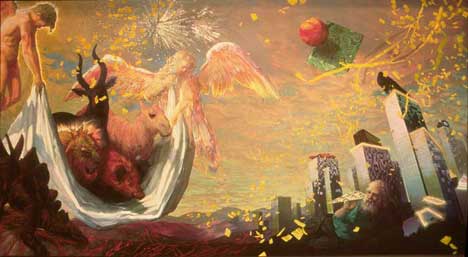120323 - Leviticus 11 - "These are unclean to you... For I am the LORD your God..."
S: 'For I am the LORD your God. Consecrate yourselves therefore, and be holy, for I am holy. And you shall not make yourselves unclean with any of the swarming things that swarm on the earth. (Le 11:44).
O: These dietary restrictions are not said to be based upon what is healthy or unhealthy, just in God's authority. (11:44,45) Having redeemed His people, He has a right to designate what is clean and unclean, to consecrate His people in their diet. That their diet was healthier by virtue of following these restrictions was only determined centuries after following them.
A: I got a strong impression of Matthew 5:48 ["You therefore must be perfect, as your heavenly Father is perfect."] in this passage, even though that is not a quote of this verse. (This verse IS quoted in 1 Peter 1:16.) The word "perfect" is not the same as "holy," though we get the same kind of feeling about it. The word translated "perfect" is teleios, which has to do with consummation or purpose. It's related to the basis of the word used to describe the argument for God's existence based upon how the universe was created with purpose in mind. (Teleological Argument)
This makes me think about what sin really is. It wasn't inherently wrong, in the way that, say, idolatry is wrong, for a Hebrew to eat pork. But in pointing out His own Holiness, His own authority and "proprietorship" as their God and their Redeemer, He was exercising His right to set forth what is right, "the mark." And sin's most basic definition is "missing the mark." This reminds me of what should always be obvious - that God is the definer of right and wrong. He is the standard-setter. Not what is convenient, helpful, generally acceptable and reasonable. All of these things are colored by self-interest, by man-centered thinking, by corrupted culture and its influence. The call to be holy is a call to separate from all of that, which could be summed up under the Bible's frequent use of the word "world," meaning "world-system, apart from God." "Love not the world, neither the things that are in the world. If any man love the world, the love of the Father is not in him."

Peter's vision in Acts 10:9-19 may have direct bearing on this idea of clean and unclean animals representing that which is holy and consecrated to God as opposed to that which is designated the anti-God world system. Peter was instructed to eat the unclean things he had never eaten before. By this, the Lord was preparing him to do what he would not be inclined to do: "fish" in the evangelistic sense for gentiles, men who were very much men of the world -- in this case, Cornelius, a Centurion. Cornelius in his appearance, his person and his office would have represented everything that was anti-Jew, anti-God. Unclean, unholy and profane. Because it was now the "fulness of time," (Galatians 4:4) God's instruction to Peter was simply another example of His right to exercise that authority to define what is the mark. Henceforth, the apostles would go to the gentiles as well. (Acts 18:6)
P: Father, help me to understand and pursue holiness, without which no man will see you.
Comments